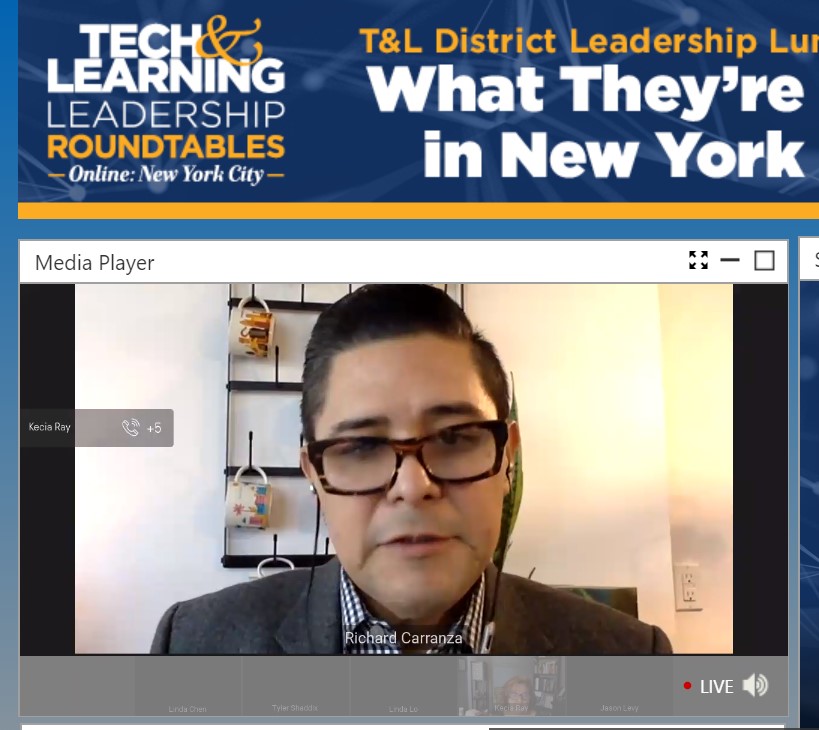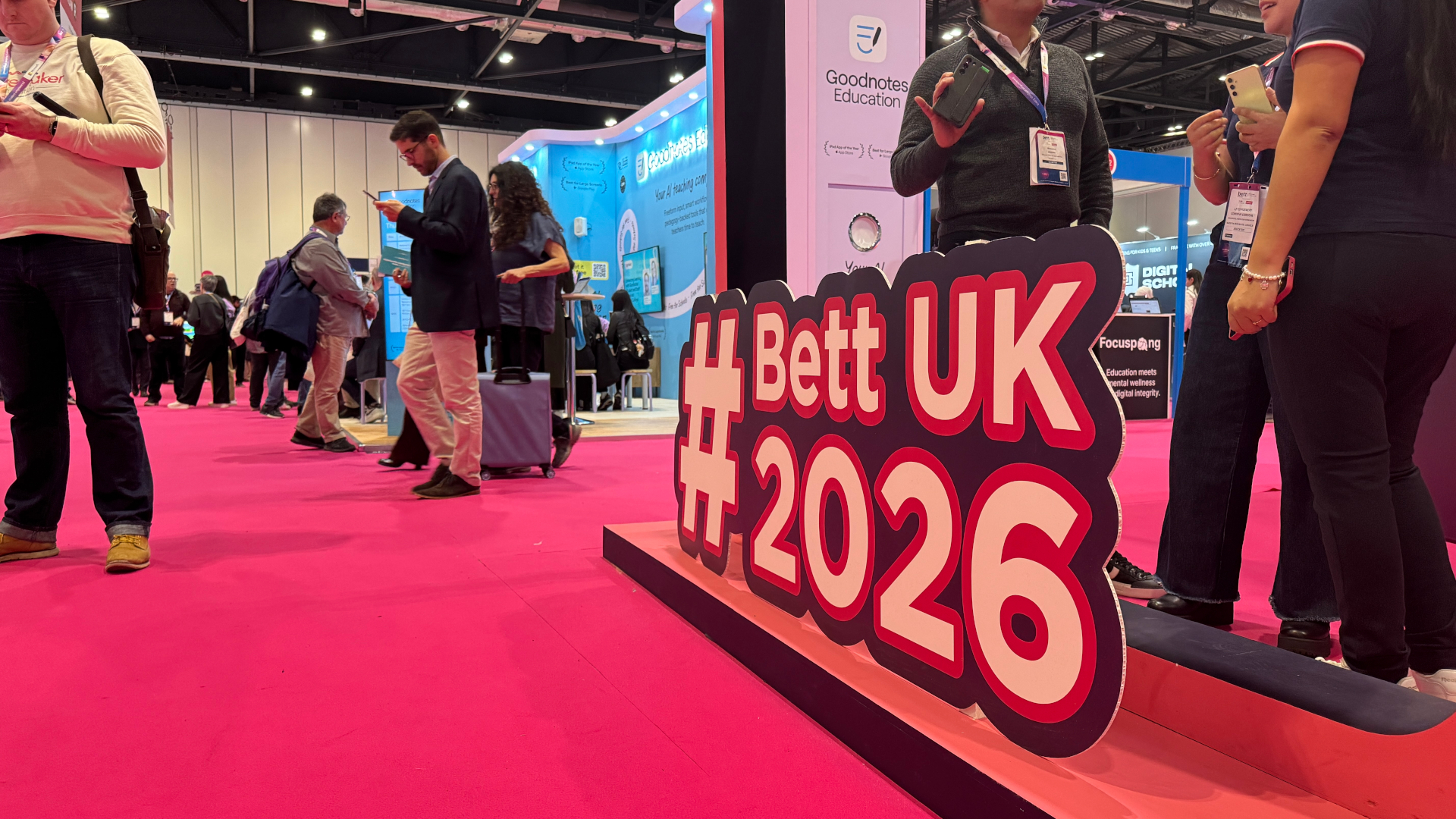Tech & Learning Remote Learning Series: What They’re Doing in New York City
The New York City Department of Education launched a remote learning program in the nation’s largest school district in a week

How the New York City Department of Education launched a remote learning program in the nation’s largest school district and at the epicenter of the COVID-19 pandemic was a Herculean effort. The NYCDOE was able to deploy thousands of devices in less than a week. Along with this deployment, the NYCDOE was also able to train teachers with a variety of formats, as well as release a vast library of curated online resources.
In this virtual roundtable conversation, Dr. Kecia Ray talked with leaders from the NYCDOE, including surprise guest Chancellor Richard Carranza, about their remote learning strategy both for short- and long-term planning.
Watch the on-demand version here.
Key Takeaways
New York City ‘tough.’ Linda Chen, Chief Academic Officer, NYCDOE, started out by saying “We’re New York City ‘tough,’ especially our families.” NYCDOE didn’t hesitate to go to remote learning, and knew that equity was going to be a challenge, and that they had to move quickly. The first thing they did was make sure every student had the NYCDOE’s email and vice versa. They then decided on district-wide platforms for learning and staff communication. She added that NYC Mayor Bill de Blasio said of remote learning, ‘Every week this will get better.’ And it has. Now they have focused on how to make it as simple as possible for students, focusing on connecting with and making sure students feel comfortable.
Moving quickly. Jason Levy, Deputy Chief Information Officer, Education Technology Strategy, NYCDOE, talked about how much was accomplished in a relatively short amount of time. They have been creating online accounts for all students for years so when it was time to deploy, it was a relatively quick process. They turned on Google for students and staff, in the process piggy backing on schools that had already been using Google Classroom.
PD also had to be provided immediately, so a remote learning calendar with multiple live “how to” sessions was created. They have already trained 25,000 staff in only about a month.
And for students who didn’t have access or a device, the district organized a plan to get iPads for students who needed it. Nearly 100,000 iPads have been distributed to students so far, with more on the way.
Tools and ideas to transform education. Sign up below.
Building partnerships. Linda Lo, Instructional Specialist, Division of Teaching and Learning, NYCDOE, discussed having to shift focus from her normal duties to vet and curate resources for remote learning. She stressed the need for building partnerships, especially how they connected with vendor partners to understand products, and have had to lean on experienced educators to better understand how to use platforms such as Google Classroom. They are now working on trying to provide ongoing PD and communicating with teachers about learning products and platforms. “Partnerships have been essential,” Lo said. “We need to come together and no longer work in silos.”
Supporting educators. Tyler Shaddix, Chief Product Officer, GoGuardian, talked about how they’ve been focused on providing tools to support teachers and remote learning, including mental health. Shaddix noted that schools are dealing with lots of challenges in terms of getting devices; although there’s been good progress, nearly 40% of schools are still unclear about what to do. He also talked about how many schools have adopted a lot of new tools, especially communication tools, such as video conferencing and chat tools, and offered how GoGuardian can partner with districts to help.
What’s next? Remote learning will have a huge impact on PD in NYC, said Linda Chen. NYCDOE has been trying to do remote PD for a while now, and this crisis will push that along. On the other side of this, we will return to a system that’s much more well-versed in remote learning and will have new opportunities for providing PD.
Seizing opportunity. Richard Carranza, Chancellor of NYCDOE, was a surprise guest to the roundtable. The new normal, once we pass the coronavirus pandemic, will never be the same, Carranza said, and the whole education landscape will look different. While we do have a crisis, there is an opportunity to change the education landscape. We need to look at the lessons learned from this event to change the pedagogy moving forward. Carranza said that we’re in uncharted territory, and anyone who says they’ve figured it out is blowing smoke. “Never waste a crisis,” he said. “Let’s take advantage of the opportunity to re-imagine opportunities for those students we serve.”
Close digital divide. Carranza also discussed how educators are ‘building the plane while flying the plane,’ and how blended learning is rapidly evolving. He stressed the need to improve blended learning PD, provide better access and devices for students, and get ‘beyond ourselves’ to learn new teaching approaches.
Removing barriers. Linda Chen talked of having to deal with change, and that this massive change has removed some of the barriers in the way of embracing blended learning.
Peer connections. Linda Lo mentioned that for teachers, shifting over to blended learning has been a challenge. Fortunately, many have been sharing with one another how to use tools, such as Google Classroom. “This is a journey, and every week we’re getting better,” Lo said. She also stressed to keep flexibility in mind, and to tap into those teachers ‘on the ground’ for feedback.
Bringing out the best. Despite the backdrop of human tragedy, it’s been incredible to see what’s been happening in the DOE in terms of the level of commitment and passion, said Jason Levy. Linda Lo said it’s been important to welcome this new digital world with open arms because at the end of the day, it’s best for our students and helping them learn. Linda Chen echoed that, adding that in the moment, there’s a need for great compassion, but also the need to use this moment to build a foundation for the future.
Lunch 'n Learn with Tech & Learning
This report is part of Tech & Learning's District Leadership Lunch ‘n Learn Roundtable series, hosted by Dr. Kecia Ray. In this series, districts from across the U.S. share their strategic plans, the challenges they are facing, and the creative solutions they are using to support students and teachers. Access previous webinars and register for our upcoming events here.
More from T&L: Lunch 'n Learn roundtable recaps
Ray Bendici is the Managing Editor of Tech & Learning and Tech & Learning University. He is an award-winning journalist/editor, with more than 20 years of experience, including a specific focus on education.
